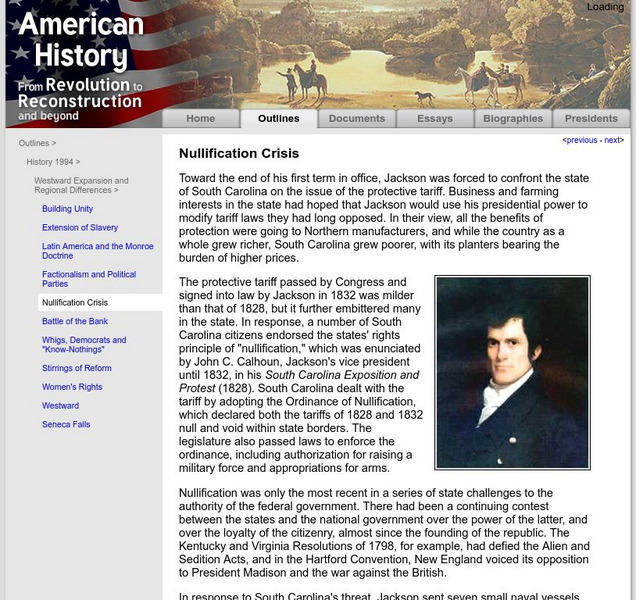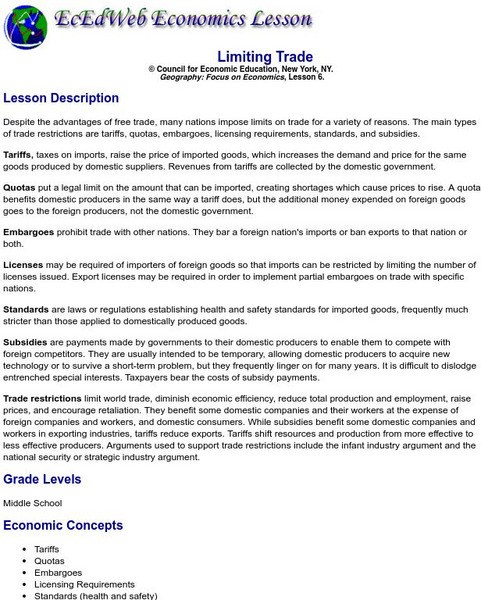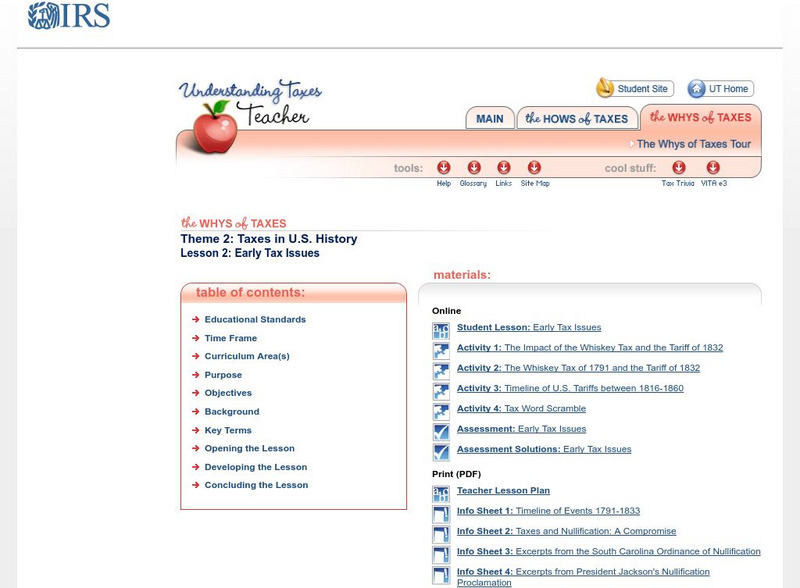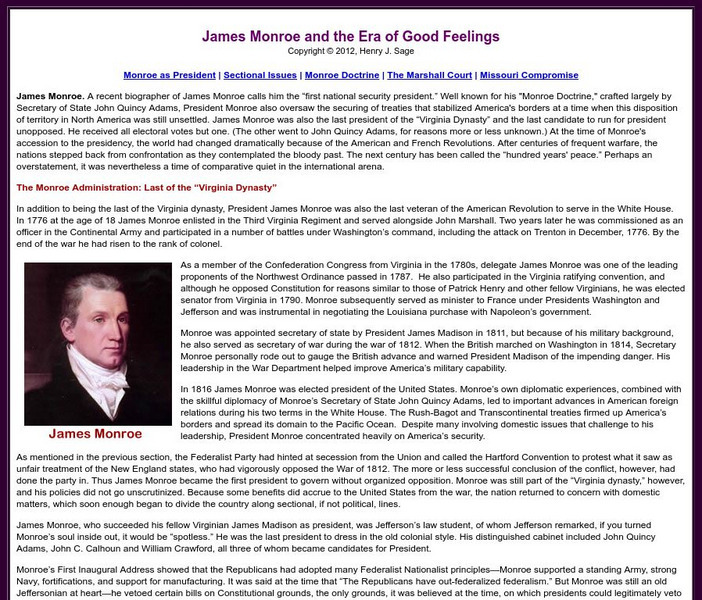Siteseen
Siteseen: American Historama: 1828 Tariff of Abominations
The Tariff of Abominations was the name given by its southern opponents to the Tariff of 1828 and was designed to protect American industry from cheaper British commodities.
University of Groningen
American History: Outlines: Nullification Crisis
This resource explains the conflict between Jackson and the state of South Carolina over the state's right to nullify federal tariffs. This conflict almost brought armed conflict between the federal government and the state.
Independence Hall Association
U.s. History: The South Carolina Nullification Controversy
The nullification controversy began as an economic dispute between north and south. See how the question about tariffs resulted in a states' rights issue in South Carolina. Read about what President Andrew Jackson was going to do about...
Digital History
Digital History: Conquering Space
A good review of how the rise of nationalism led to western expansion, support for federal funds to build infrastructure, and the protection of new American industry.
University of Nebraska Omaha
University of Nebraska: Limiting Trade
At this site from the University of Nebraska, students can learn about various types of trade restrictions and their effects by applying a model to determine who will benefit and who will be hurt by a tariff.
University of Virginia
Miller Center at Uva: u.s. Presidents: John Quincy Adams: Domestic Affairs
John Quincy Adams did not have any easy time as president. Read about his dreams for the nation, and what really was implemented.
Internal Revenue Service
Irs: Early Tax Issues Lesson Plan
This lesson plan will help students understand how some historical events were inspired by tax issues and how tax issues shaped some of the government's actions and policies in the past.
Henry J. Sage
Sage American History: James Monroe and the Era of Good Feelings
A complete look at the administration of James Monroe and the policies of the Era of Good Feelings. You can read about the domestic policies, foreign affairs, and important decisions of the Supreme Court made during the Monroe...
Harp Week
Harp Week: The Presidential Elections: 1896 Mc Kinley v. Bryan
A three-page look at the campaign and election of 1896 in which William McKinley, the Republican candidate, ran against Wiliam Jennings Bryan, the Democratic candidate. Read about the nominating conventions, the platforms, and the...
Harp Week
Harp Week: The Presidential Elections: 1884 Overview
The campaign of 1884 was filled with scandals and recriminations from both parties. Read about the conventions that selected presidential candidates and read about the campaigns and election.
Other
Austin Community College: Herbert Hoover's Tragic Presidency
Austin Community College provides "A More Balanced Historical Perspective," an article that looks at Herbert Hoover's administration and his response to the Great Depression.
Other
Earliest Voices: Gallery From the Vincent Voice Library
This site addresses the advent of the voice recording. The introduction talks about the country at the time of this invention, the feelings of people on the topic, and early recording itself. Included are voice recordings of such...
Missouri State University
Missouri State University: Lost World of Gilded Age Politics
This extensive look at politics between 1876 and 1896 describes how the Republican Party functioned during this time and how the excesses in politics resulted in reform and the next era in politics, the Progressive Era. A very...
Khan Academy
Khan Academy: Us History: 1800 1848: The Presidency of John Quincy Adams
John Quincy Adams narrowly beat Andrew Jackson in the presidential election of 1824. Though his 'American System' modernized the American economy, his endorsement of a protective tariff as well as his lenient stance toward Native...
Curated OER
Etc: Maps Etc: House Vote on the Mc Kinley Tariff, 1890
A map of the United States showing the results of the House vote on the McKinley Tariff Bill, 1890. The proposed tariff was on imported manufactured goods, and while protecting the manufacturing industry, placed hardships on the...
University of California
Uci: Issue Guide: Trade Embargoes, Seals, and More
Trade embargo is first defined and then discusses seal embargoes in depth. This gives a good overview of how embargoes work.
iCivics
I Civics: Government & the Economy
Students learn how government and the economy are related and the difference between market, command, and mixed economies.
Digital History
Digital History: The Presidency of John Quincy Adams
Read about the many problems encountered by John Quincy Adams during his presidency, most not of his making, but a reflection of the split in the philosophies of the National Republicans and the up-and-coming Jacksonian Democrats.
Digital History
Digital History: Conservative Policies and Presidents [Pdf]
Starting in 1920 the United States had three presidents who followed conservative policies. Read about their policies, and determine whether they made the U.S. a more economically sound country. [pdf]
Curated OER
National Park Service: Biographical Sketches: Warren Harding
This concise article about Warren G. Harding gives information about his early life, how he got into politics, and his election as 29th president. There is brief mention of his domestic and foreign policies.
Digital History
Digital History: The Sections [Pdf]
Soon after the end of the Revolutionary War, the characteristics of the various parts of the new United States established themselves. Find out about the sectionalism, economy, and needs in the country in the early 1800s--the...
Digital History
Digital History: The Industrial Revolution [Pdf]
This site covers both the initial Industrial Revolution in the United States in the late 18th and early 19th centuries and the second revolution that highlighted new inventions and the businessmen who financed industry. Read brief...
University of Groningen
American History: Outlines: Industrial Growth
By 1860, when Abraham Lincoln was elected president, 16 percent of the population lived in urban areas and a third of the nation's income came from manufacturing. Funds were flowing into large-scale industrial development and into...
University of Virginia
Miller Center at Uva: u.s. Presidents: William Mc Kinley: The Campaign and Election of 1896
Read about the campaign of 1896 in which William McKinley represented the Republican Party and William Jennings Bryan the Democratic Party. One big issue was the contrast between the use of the gold standard as opppsed to free silver.



















